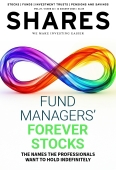Archived article
Please note that tax, investment, pension and ISA rules can change and the information and any views contained in this article may now be inaccurate.
Fund managers' forever stocks

A recent report from consultants McKinsey explored the subject of what long-term ‘intrinsic investors’ want from companies and how in return companies can benefit from the presence of a strong a stable shareholder base.
The bottom line is a strong, stable shareholder base tends to lead to higher returns, not just for businesses but for their investors too, creating a kind of virtuous circle. In this article we look at this phenomenon in more detail and hear from leading fund managers about their ‘forever stocks’
First though, how can companies encourage ‘intrinsic’ long-term shareholders to join the register and generate higher returns, and are there any useful UK examples?
ENGAGEMENT IS KEY
Most executives know they need to communicate early and often with long-term intrinsic investors, say the report’s authors Tim Koller and Prateek Gakhar.
‘Compared with, for instance, mechanical investors and traders, intrinsic investors are paying closer attention to companies’ performance metrics, potential to create value over the long term, and strategic decisions—and making their investment decisions accordingly,’ say Koller and Gakhar.
Long-term intrinsic investors are also the ones most likely to champion a company’s prospects in the market, influencing other investor segments to follow suit, they argue.
They are also the ones who provide valuable guidance and feedback to management, and who will likely ride out volatility with a company, claim the authors.
The report analysed data for some 320 of the largest US companies by market value between 2012 and 2022 and found those which experienced an increase in ownership by long-term intrinsic investors also saw an increase in total shareholder return).
The analysis shows companies with increased intrinsic ownership also grew their revenue faster and improved their return on invested capital (excluding goodwill), while trading at a higher multiple of operating earnings.
The report concludes there is a virtuous circle whereby companies which engage with long-term shareholders tend to perform better, not just operationally but also in stock market terms, which in turn attracts more long-term ‘intrinsic’ investors.
WHAT DO SHAREHOLDERS WANT?
The authors argue the companies which demonstrated increased ownership by intrinsic investors tended to do three things well.
First, they were able to increase their market share using ‘commercial excellence (including doubling down on digital channels), geographic expansion and product innovation, among other actions’.
Second, they ‘consistently and effectively’ allocated capital well, both to grow their business and operate more efficiently, a trait which many great investors value highly and which makes them loyal supporters of the management.
Third, some of the companies underwent full-scale transformations and were able to sustain higher returns over time. In some cases, the transformation was led by external factors, such as an activist investor campaign, while in others it was a change of leadership which brought about operational change.
Conversely, companies with decreased intrinsic-investor ownership were either ineffective allocators of capital, particularly in the case of M&A; facing secular decline, meaning growth was decelerating; or they were valuation outliers, meaning their stock prices were discounting the best of all possible worlds.
In essence, the authors conclude, companies get the investors they deserve: if they focus on their operating performance, in time the ‘right’ investors will follow.
'FOREVER' STOCKS
When asked what his ideal holding period was for companies in Berkshire Hathaway’s (BRK.B:NYSE) portfolio, Warren Buffett famously replied ‘forever’. In case of point Buffett has owned (and consumed) Coca-Cola (KO:NYSE) for decades.
But what about those steering portfolios on this side of the Atlantic? We asked several leading UK fund managers which stocks in their portfolios they regard as ‘forever’ holdings, with some surprising results. In practice these stocks might not be held indefinitely but, at the very least, these names are ones which the managers in question are happy to hold for the foreseeable future.
TAPPING INTO TESCO
Tom Matthews, Vish Bhatia and Mark Costar, co-managers of the JO Hambro UK Dynamic Fund (B4T8552), identified grocery giant Tesco (TSCO) as a ‘forever’ stock, and the fund’s history with it provides a good example of why companies should reach out and engage with ‘intrinsic’ investors.
‘While several companies have been long-term holdings, Tesco (TSCO) is a standout’, say the team. It was first purchased at the fund’s inception in 2008 and is still a top 10 position today.
Its presence in the portfolio ‘perfectly illustrates our investment philosophy: a great long-term investment requires not just a great business model but also a strong culture of generating recurring equity value and an attractive share price’, add the managers.
Despite being a great business, in the late 2000s Tesco management took a ‘growth-at-any-cost’ approach, say the team, destroying value with investments in restaurants and expansion in the US at the expense of the UK business, which became uncompetitive.
With the company’s eye off the ball, Aldi and Lidl seized the opportunity and carved out market share at Tesco’s expense, leading the team to sell the shares before its price halved in 2014.
Following the arrival of new management and a renewed focus on Tesco’s core UK market, price leadership and reducing debt, the fund rebuilt its position in 2017, and while another new team has taken over at Tesco the core strategy remains the same.
The company has regained market share and now has the biggest ever lead over its main rival, Sainsburys (SBRY), while free cash flow reached £3 billion last year compared with almost zero a decade ago.
In addition, new management has leveraged the firm’s scale by focusing on ‘capital-light’ growth platforms like expanding the market-leading finest* premium range and Retail Media services.
‘Tesco is once more a great business, but this time it’s matched by a culture of creating recurring equity value for its investors. With the current share price implying a 7% free cash flow yield, Tesco remains a great investment and is a core holding we intend to own for the long run,’ say the managers.
TRUSTING IN TRUSTPILOT
Karan Singh, manager of the Fidelity UK Opportunities Fund (BH7HNZ8) and Fidelity UK Select Fund (BFRT394), expects to be a long-term holder of online ratings platform Trustpilot (TRST).
Singh explains his reasoning: ‘Trustpilot operates in a large, underpenetrated market, with over four million company domains but only 27,000 paid customers. The average customer spends over $9,000 annually, supporting a potential high teens growth runway over the medium term. While the UK is its mature market, where it launched in 2013, revenue is still growing at over 15% per year.’
As he observes the value for businesses is material given the impact a Trustpilot score can have on the effectiveness of marketing spend.
‘Trustpilot also provides valuable customer insights and analytics that enhance business performance. For large enterprises, a paid subscription is a logical choice,’ Singh adds.
‘The company economics are highly attractive. Trustpilot is a software as a service (SaaS) business, with retention rates above 100%, strong cash flow generation and low capital intensity. As the company grows, margins are expected to expand. Management run the company prudently with a net cash balance sheet and have demonstrated good capital discipline.’
The manager of Latitude Horizon (BDC7CZ8), Freddie Lait, has been a long-term holder of US automotive parts and accessories specialist AutoZone (AZO:NYSE). He says: ‘I have owned it for 16 years. The business has generated a 23% annualised return, supported by a 17% annual growth in EPS.
‘The runway for growth remains strong with 50% of the US auto parts market still highly fragmented, susceptible to AutoZone’s superior operating model over time. The business is defensive, predictable, and highly cash generative, growing at twice the rate of the market yet trading around a market multiple.’
Value managers and ‘forever stocks’
Managers who put the emphasis on value are less likely to hold stocks for a very long time as they will often sell when a company reaches a certain valuation threshold.
Simon Gergel, who steers The Merchants Trust (MRCH), doesn’t think about ‘forever stocks’ per se, but when he buys a company for the fund, he does like to think ‘that we would be willing to own this for a very long time, but we are value driven’. Gergel recently sold the trust’s entire holding in retailer Next (NXT) following a stellar run for the stock.
‘I think Next is a great business,’ says Gergel. ‘But it’s not necessarily a great investment opportunity if the shares have re-rated, so I wouldn’t want to say that these companies (in the trust) are forever stocks, that’s not the way we approach it. There are companies that have been in the portfolio a very long time like Shell (SHEL), where the position size has moved a lot over the last 10, 15 years, but it is a big stock in the market and we’ve generally had a positive view on it. We wouldn’t own it if we didn’t have a positive view.’
Important information:
These articles are provided by Shares magazine which is published by AJ Bell Media, a part of AJ Bell. Shares is not written by AJ Bell.
Shares is provided for your general information and use and is not a personal recommendation to invest. It is not intended to be relied upon by you in making or not making any investment decisions. The investments referred to in these articles will not be suitable for all investors. If in doubt please seek appropriate independent financial advice.
Investors acting on the information in these articles do so at their own risk and AJ Bell Media and its staff do not accept liability for losses suffered by investors as a result of their investment decisions.
Issue contents
Exchange-Traded Funds
Feature
Great Ideas
News
- Eli Lilly shares under pressure after disappointing clinical trial results
- Recruiter Hays set to update expectations with shares at decade-low
- Record numbers of US companies are beating revenue and earnings forecasts
- Fresnillo up 180% year-to-date after latest strong results
- All eyes on second-quarter retail bellwether Walmart
- Bellway brings a ray of light to the housebuilders with its half-year update
 magazine
magazine








